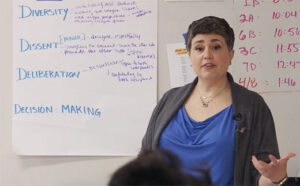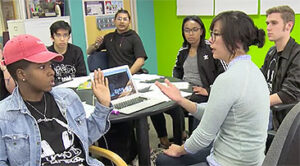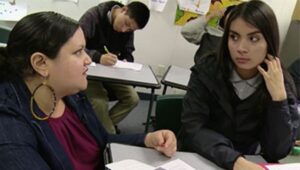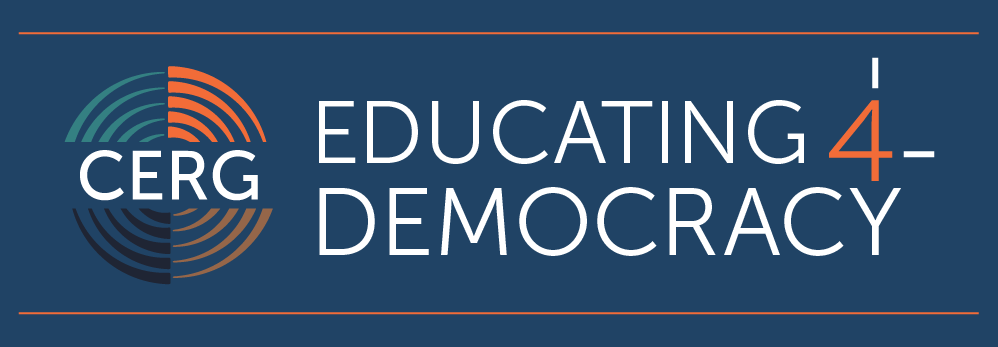Preparing students to participate thoughtfully and effectively in civic and political life is increasingly important in this challenging time of hyper partisanship, the COVID-19 pandemic, climate crises, and struggles for racial justice. In fact, two thirds of people in the United States think democracy is under threat (Vinopal, 2021), and roughly 80% think that Republican and Democratic voters do not agree when it comes to basic facts (LaLoggia, 2018). In addition, seven out of ten find online political discourse “stressful and frustrating” (Anderson & Auxier, 2020).
Educators play an important role in helping young people to learn how to judge the credibility of information they find online, discuss and deliberate with people who have differing opinions, express their perspectives in a variety of mediums, and participate in democracy. To explore the possibilities, visit Educating 4 Democracy website – a collection of videos and resources for educators, leaders, and school districts interested in preparing youth for democracy.
You will find the following topics:
- Civic Investigation & Research – How do I help students research issues that matter to them?
- Civic Discussion & Deliberation – How do I help students have productive discussions about current events and controversial issues?
- Civic Voice – How can students voice their perspective on issues that matter to them?
- Civic Action – What are effective ways to take action in the digital age?
- Civic Knowledge – How do I further students’ civic knowledge and understanding?
- Civic Assessment – How do I assess my students’ civic learning?
- CA State Seal of Civic Engagement – For educators in California, you will find resources aligned to the criteria for the SSCE to support your students in being recognized and celebrated for their civic engagement
Three Educators’ Approaches
 Elizabeth (Liz) Robbins is a high school Social Studies teacher in Chicago, Illinois. One helpful approach she utilizes in the classroom is a Structured Academic Controversy or SAC. This approach is illustrated in this video, “Structured Academic Controversy (SAC): A Strategy for Civic Discussion.” In the lesson, students deliberate suffrage at age 16 through an approach called Structured Academic Controversy. Students read and analyze text, develop respectful group discussion skills, practice building consensus, and write informal policy statements. The strategy practices essential skills and dispositions needed to shift from political divide to discussion. It asks students to suspend their current beliefs and consider varied perspectives on the issue, collaborate with others to ensure a shared understanding of those perspectives, and work to come to consensus for effective policy recommendations despite differing views.
Elizabeth (Liz) Robbins is a high school Social Studies teacher in Chicago, Illinois. One helpful approach she utilizes in the classroom is a Structured Academic Controversy or SAC. This approach is illustrated in this video, “Structured Academic Controversy (SAC): A Strategy for Civic Discussion.” In the lesson, students deliberate suffrage at age 16 through an approach called Structured Academic Controversy. Students read and analyze text, develop respectful group discussion skills, practice building consensus, and write informal policy statements. The strategy practices essential skills and dispositions needed to shift from political divide to discussion. It asks students to suspend their current beliefs and consider varied perspectives on the issue, collaborate with others to ensure a shared understanding of those perspectives, and work to come to consensus for effective policy recommendations despite differing views.
 Teresa Chin works with youth in downtown Oakland, California at YR Media — a media production company driven by young people. One thing she works with youth on is the development of first-person commentaries. She wants them to learn how to draw on their life experiences in order to share their perspective on a societal issue with a broad audience. As Teresa explains, “Commentaries are a really powerful tool for civic engagement. Your story is how you can get people to build empathy and understanding.” Here is a video of how Teresa does this as well as related curriculum materials: Writing Commentaries: The Power of Youth Voice.
Teresa Chin works with youth in downtown Oakland, California at YR Media — a media production company driven by young people. One thing she works with youth on is the development of first-person commentaries. She wants them to learn how to draw on their life experiences in order to share their perspective on a societal issue with a broad audience. As Teresa explains, “Commentaries are a really powerful tool for civic engagement. Your story is how you can get people to build empathy and understanding.” Here is a video of how Teresa does this as well as related curriculum materials: Writing Commentaries: The Power of Youth Voice.
 Chela Delgado teaches high school in Oakland. She has her students research an issue they find compelling and study its root causes. They then develop a theory of change, engage in an action project, and present their findings to the community. As part of this effort, she has her students learn to create infographics. She wants them to develop skills to communicate their perspective succinctly and to clarify their theory of change. Her broader goal is to help students come to see themselves as informed and effective actors in their community and beyond. See how Chela makes this happen and check out her lesson plan in Infographics for Change.
Chela Delgado teaches high school in Oakland. She has her students research an issue they find compelling and study its root causes. They then develop a theory of change, engage in an action project, and present their findings to the community. As part of this effort, she has her students learn to create infographics. She wants them to develop skills to communicate their perspective succinctly and to clarify their theory of change. Her broader goal is to help students come to see themselves as informed and effective actors in their community and beyond. See how Chela makes this happen and check out her lesson plan in Infographics for Change.
Liz, Teresa, and Chela are focused on different kinds of civic media skills. But, they share a core commitment — preparing students to be active participants who can help strengthen our democracy.
Preparing Students to Participate in Democracy
To be sure, the civic and political challenges we currently face have multiple roots and will require action on many levels. But, as educators, it’s incumbent on us to ask what we can do. And countless educators, like Liz, Teresa, and Chela, working in schools and in youth organizations, are doing just that. One thing that makes these efforts exciting is that many educators are recognizing that educating for democracy can and should be accessible to all youth whether in after school programs or as a part of the core curriculum during the school day. Supporting youth to build the critical skills and capacities needed to participate thoughtfully and effectively in their community and society is not easy, but its import is clear.
The Educating 4 Democracy website provides a collection of videos that show a range of ways to do this in a variety of contexts. There are also related resources and background information to help educators learn more. This site was developed by the Civic Engagement Research Group (CERG). The videos on this website have been developed by CERG through partnerships with school districts and, at times, with other organizations such as the Teaching Channel. New content will be added on an ongoing basis, so follow @Ed4Democracy on Twitter and sign up for the Educating for Democracy newsletter for regular updates.


